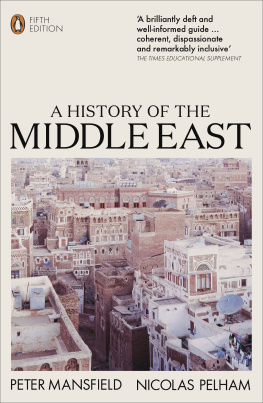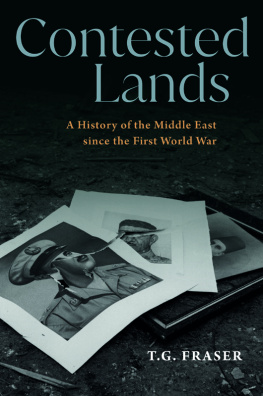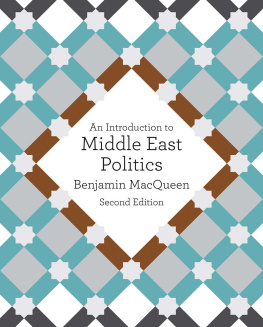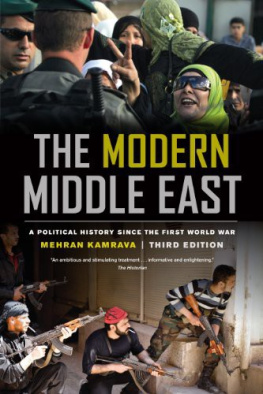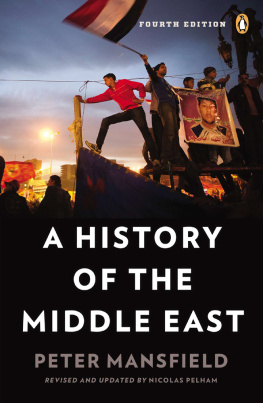About the Authors
Peter Mansfield was born in 1928 in India. In 1955 he joined the British Foreign Office and went to Lebanon to study Arabic at the Middle East Centre for Arabic Studies. From 1961 to 1967 he was the Middle East correspondent for the Sunday Times. He became one of Britains foremost experts on the region. Peter Mansfield died in 1996.
Nicolas Pelham is the Economists Middle East correspondent. He began working in Cairo as editor of the Middle East Times and since then has spent thirty years studying, travelling and writing in the region. He has worked for the BBC Arabic Service and Financial Times and writes for The New York Review of Books. He is the author of A New Muslim Order (2008) and Holy Lands (2016) which explores the regions pluralist past. Taking occasional breaks from journalism, he has worked as a Middle East analyst for the International Crisis Group, the United Nations and the Royal Institute of International Affairs. In 2017 he won the Gerald Loeb Award for Distinguished Journalism.
To Luis Caizares
Peter Mansfield
A HISTORY OF THE MIDDLE EAST
Fifth Edition revised and updated by Nicolas Pelham

PENGUIN BOOKS
UK | USA | Canada | Ireland | Australia
India | New Zealand | South Africa
Penguin Books is part of the Penguin Random House group of companies whose addresses can be found at global.penguinrandomhouse.com.

First published in Viking 1991
Published in Penguin Books 1992
Second edition 2003
Third edition 2010
Fourth edition 2013
Fifth edition 2019
Copyright the Estate of Peter Mansfield 1991
Nicholas Pelham, 2003, 2010, 2013, 2019
The moral right of the author of the new material has been asserted
Cover photograph Sanaa, Yemen George Hammerstein/Getty Images
Cover design: Jim Stoddart
ISBN: 978-0-141-98955-6
This ebook is copyright material and must not be copied, reproduced, transferred, distributed, leased, licensed or publicly performed or used in any way except as specifically permitted in writing by the publishers, as allowed under the terms and conditions under which it was purchased or as strictly permitted by applicable copyright law. Any unauthorized distribution or use of this text may be a direct infringement of the authors and publishers rights and those responsible may be liable in law accordingly.
Maps
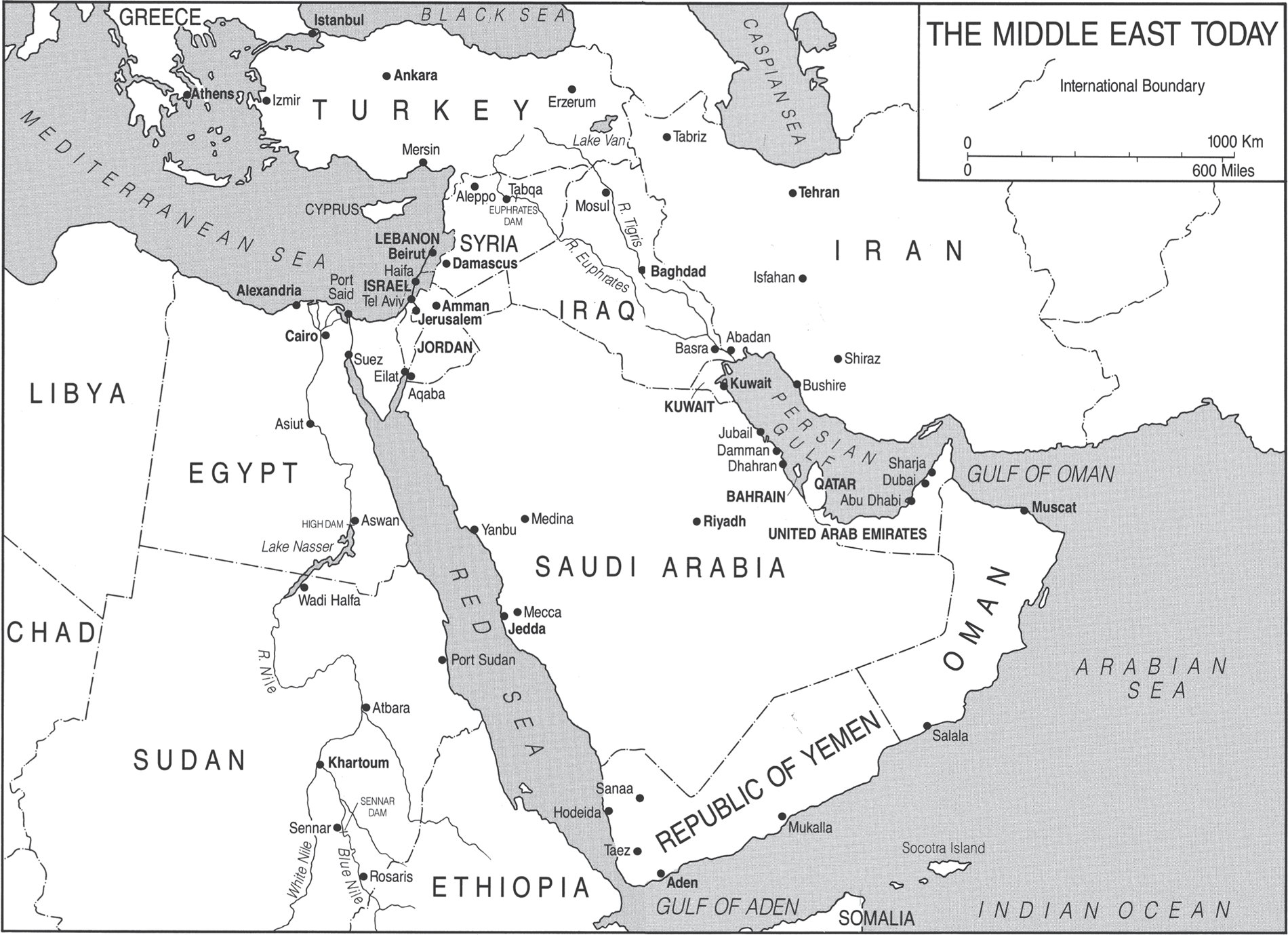
Foreword to the Third Edition
In his concluding chapter, Prospects for the Twenty-first Century, written two decades ago, Peter Mansfield proved remarkably prescient. He predicted the resurgence of an armed Islamic movement across the Middle East. He foresaw that Arab regimes, however slim their power-bases, would survive. But there was one prediction where he went badly awry. In the concluding paragraph of the History, Peter ventured that as the Cold War faded away, the United States would lose its raison dtre as a military presence in the Arab world, and would hardly maintain its superpower status in the region.
Perhaps had Western policy-makers harkened, much of the subsequent bloodshed might have been averted. Certainly it is hard to argue that the Middle East is any better for the military intervention that followed. When he completed the first edition almost two decades ago, the United States was at the peak of its power. It was celebrating victory after chasing Iraq out of Kuwait; the mujahideen it backed in Afghanistan had won their jihad against the Soviet Union, and Arab states were for the first time preparing to sit down publicly with Israel to negotiate an end to their conflict.
In hindsight it looks a more innocent age. US policies in a region ten thousand miles away have boomeranged, at a cost of thousands of American lives both at home and in the Arab world. After returning to war with Iraq, the US is beating a retreat with the countrys promised political and economic reconstruction still unrealized. In Afghanistan as well as many places elsewhere, the US is fighting its former allies. And after two decades of on-off negotiations, the promised end of conflict between Israel and the Arab world remains as elusive as ever. And under Americas watch hundreds of thousands of Middle Easterners have perished in continuing conflicts in Iraq, Algeria, Sudan and Israel/Palestine. US credibility in the region is in tatters.
This update of the History attempts to analyse what went wrong. In two new chapters, it looks at unfolding US policy towards Iraq, the ArabIsraeli conflict, and the evolving jihadi movements. It suggests that rather than seek to opt for regime change from without, US interests would be better served by working with the existing political movements on the ground. Peter understood that to resolve conflicts, societies have to be at peace not just with their enemies but also with themselves. What the Arab world urgently needs is more democracy, wider political participation and much greater respect for human rights, he wrote two decades ago.
Almost universally, the deficit is greater today than it was then. Since Peter wrote his book, the Middle East has shrunk in on itself and become a more embittered, suspicious and intolerant place. Cosmopolitan cultures have atomized into their communal parts. For the vast majority of Arabs, the promise of independence has failed to materialize. For Palestinians, their homeland has been cut into an obstacle course of walls and checkpoints, rendering movement for an entire population the most restricted anywhere on earth. From where I write, I like millions of others can travel barely five minutes without being asked for my papers.
Whether the United States can yet be a force for good in the region is much debated. The outpouring of support President Obama received following his May 2009 Cairo address is testimony to the belief of many that it can. Clearly too a superpower cannot withdraw from a region that fuels the world. But as the past decade has shown, Americas armadas, bombings and military bases spark more problems than they solve. And after President Obama invested his political capital in Israel and Iran with no immediate dividend, scepticism abounds that persuasion and soft power can do any better.
Recent books on the Middle East commonly end with a prophecy of better days ahead. Invariably those written in recent years have had their dreams dashed. But if there is now a silver lining, it is that as the US prepares to withdraw from Iraq, the peoples of the Middle East are again honing their own methods of conflict resolution and self-determination. As Peter notes, over the centuries, the Middle East has confounded the dreams of conquerors and peacemakers alike. Come the next edition, perhaps the region will again be able to look forward to more Pax and less Americana.
I am grateful to Luis Caizares, to whom Peter dedicated his History, for trusting me to don Peters mantle and update the text; to my agent Michael Sissons for seeking me out; and to Simon Winder of Penguin for his patience. My contribution has benefited greatly from the editors I have been fortunate to work with during my years in the region: Barbara Smith and Xan Smiley, Middle East editors at

